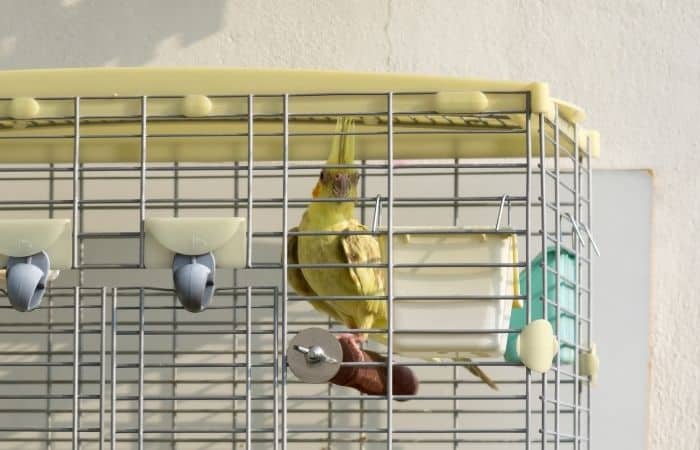Usually, noise doesn’t affect cockatiels when they feel safe in the surrounding environment. Their own constant squealing, chattering, and chirping prove that they can adapt to low noises. The birds will quickly go to sleep anytime in the day. Your pet can adapt to lower frequencies of sound.
So can cockatiels sleep with noise? Well, only when the sound isn’t too high. These pets are only sensitive to sounds ranging from 250 to 8,000hz at home. Above this range, anything will make them uncomfortable.
Moreover, loud unbearable noises aren’t suitable for these small parrots as they can damage their ears. Thus, ensure there is not too much commotion at your place. Only white noise provides a comfy environment for your pet.
Is it okay to sleep with cockatiel in the same room?
You can share a bedroom with a cockatiel but cannot sleep in the same bed with the bird. It can make your pet uncomfortable and disturb its sleep. Besides, there is also a risk of suffocating your pet unknowingly when you change over your sleeping position. So always keep cockatiel in its cage.
Related Post : Can Indian Ringnecks And Cockatiels Live Together?
On the contrary, sleeping with your pet is even a bad idea for pet owners if they are allergic to bird feathers and dust. Thus, sharing space is not a safe choice for you and your pet both.
Do loud sounds scare cockatiels?
Yes, loud sounds can scare cockatiels like any other animal. They won’t accommodate well in environments with loud and sudden noises. Nearby construction, drilling, woofers, and loudspeakers can be the reason for fear for your pets.
The loud noises will leave them startled, which results from quick reflexes and a moment of basic survival instinct.
This dread can even stay longer. Also, the survival instinct of the birds increases in captivity. Thus, your pet becomes more conscious even of a single noise at night.
They always try to beware of any passing predators making them far more likely to fly away instinctively.
So, can cockatiels sleep with noise? Yes, you just need to be extra careful while keeping these small birds at home.
What are the signs of stress in cockatiels?
Apart from lack of sleep, you will also notice some extreme physical or behavioral changes in cockatiels due to stress from high sounds. Know the signs of distress in these birds:
Biting
Don’t mistake this behavior as a sign of aggression. Instead, biting is a common indication of fear and stress among cockatiels. They do this to protect themselves.
Eats Less
A stressful condition also reduces appetite among birds. Eventually, they can also lose weight. When you see such a sign, take an instant action to improve their surrounding conditions.
Feather Picking
Feather picking is another indication of stress in these small parrots due to unbearable sounds. As a result, they will start picking and won’t stop even after the noise stops.
Screeching or lessened vocalization
Screeching too much or not speaking at all are both signs of fear in cockatiels. So, whenever you see a change in their behavior, instantly shift their cage to a new peaceful location.
Related Post : Can Cockatiels Mate With Their Siblings?
Reducing intense sounds and even talking softly around your pet may help your cockatiel scream less. On the other hand, complete silence in the house should never be your goal. It is also not suitable for cockatiel as they are lively pets.
Ways to Create Peaceful Setting for Cockatiels at Home
Does your sibling love to listen to loud music all day long? Or is there construction work at a nearby site? It will help if you shift your cockatiel from such noisy environments as soon as possible.
It might be challenging to prevent loud noises every time. But a few changes inside and outside of the cage can help your cockatiels adapt quickly to your place.
Check out these crucial tips to create a soundproof environment for your new pet.
Right Location
Cage setup is of utmost importance for your bird to stay indoors peacefully without any fear. Never place the cage in a busy or noisy location of your home. Also, avoid window areas where loud sounds from outside can disturb them.
Never think of putting your cockatiel’s cage near the television. The loud sound can be scary for them, while it can damage their sleeping patterns. However, adapting to the low volume sound is not a cause of concern for your bird. In fact, they will enjoy time in front of a TV with you.
Besides, placing the cage above your refrigerator is another terrible idea. Vibration sound will not only frighten them but will even cause health issues in your pet.
Cover the Cage
Creating a cozy environment for the cage ensures your pet gets a sound sleep. You can cover your cockatiel’s cage to provide a safe resting place at night. It will suppress any loud sounds terrifying the pet. But make sure it is not entirely dark.
Install Air Purifier
An air purifier creates white noise. If you and your cockatiel live in the same room, install an air purifier to keep your pet calm.
Lightening
The night light also creates a calming aura for cockatiels while sleeping. Thus, saving them night frights.
Conclusion
Not all sounds are similar and can frighten cockatiels. Even though these birds have their own natural way of adapting to a new location, you need to make them feel like a home. Can cockatiels sleep with noise? Well, loud sounds can generally lead to sudden fear in these small parrots, which affects their sleep.
So, keep them away from a too loud environment if you notice any distressful symptoms or behaviors in your pet.
